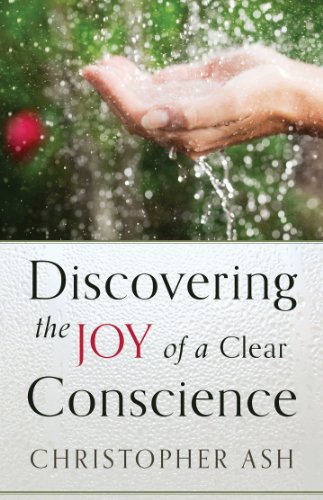Paul took “pains to have a clear conscience toward both God and man” (Acts 20:16). So should we.
Christians must prize and protect a biblically informed conscience. Heed our conscience, and we shall honor God and faithfully serve our fellow man. Resist conscience, and we wreck not only our lives, but also harm others, leaving a trail of brokenness, heartache, and misery.
Given the stakes, it is tragic that conscience is a word that has largely slipped from our vocabulary. That’s why I am grateful for Christopher Ash. In Discovering the Joy of a Clear Conscience he proves himself a skilled physician of the soul. Aiming straight to the heart, he asks: “If you die today and have some time for final words, will you be able to say, ‘I have nothing bad on my conscience; I can face whatever comes after death with confidence and not fear, because I know my conscience is clear?'” His book is an attempt – to my mind successful – to help believers answer yes.
Like all good teachers, Ash defines his terms. “Conscience is our self-awareness, particularly about right or wrong. It is the faculty within us that enables us to distinguish between them. It pushes us away from wrong and pulls us to towards right. It looks both forwards and backwards. Others can appeal to it when trying to persuade us to behave well. And repeatedly in the Bible God himself appeals to it.”
To get at the issue of a biblically informed conscience, Ash organizes his instruction under four headings:
- Conscience as Guide
What do Christians mean by conscience and how does it function in the life of both believer and unbeliever? - Conscience as a Symptom
What does the conscience, guilty or clear, tell us about oneself? - The Choice We All Face
How is the conscience hardened? What does a spiritually awakened conscience look like? Why is Christ’s obedient life and atoning death indispensable to a cleansed conscience? How does the sanctification process in a believer, with all its imperfections, relate to Christ’s once-for-all sacrifice that makes his people perfect? - Developing a Christian Conscience
What is an over-sensitive and under-sensitive conscience? How does a mature believer take into account the conscience struggles of his Christian bothers and sisters? How do repentance and faith relate to a clear conscience?
It is especially important for preachers to keep a clear conscience. After all, biblical preaching appeals to the conscience (2 Corinthians 4:2), and how can a preacher appeal to the consciences of his hearers while ignoring his own? Therefore, “it is important that the preacher’s conscience first be stirred and touched before he seeks to awaken his hearers; [and quoting John Owen] ‘If the word do not dwell with power in us, it will not pass with power from us.'”
Each chapter of this fine book concludes with probing questions that serve well both individual reflection and, with some adaptation, group discussion.
Ash concludes where he began, searching the heart: “Could you end each day with the words, ‘I have a clear conscience?'” Good question. For apart from the Lord and his salvation, nothing is more precious to a believer than a clear conscience.
